The Mighty Barnum
Cast & Crew
Walter Lang
Wallace Beery
Adolphe Menjou
Virginia Bruce
Rochelle Hudson
Janet Beecher
Film Details
Technical Specs

Synopsis
In 1935, scenes of Barnum and Bailey's Greatest Show on Earth are presented. One hundred years earlier in New York City, P. T. Barnum, the proprietor of a general store, upsets his wife Nancy by continually buying freaks of nature, such as a stuffed two-headed calf and a three-headed frog. Barnum further irritates his wife by keeping in their house the alcoholic Mr. Walsh, an "educated" man whom Barnum hopes will help him open a museum of freaks once he has given up drinking. When the Barnums' niece Ellie tells Mr. Walsh that she loves him, he promises that he will not fall in love with anyone else until she comes of age. Having had enough of her husband's obsession, which has left them in debt, Nancy gives him money sent from her father to buy railroad tickets for them to return to Connecticut. Barnum, however, sees Mr. Walsh order buttermilk in a saloon and decides that it is time to go into business. He uses $200 of his wife's money to rent a livery stable in which to exhibit his collection and the remaining $50 to pay promoter J. P. Skiff for the right to exhibit Joice Heth, supposedly a 160-year-old woman who was the nurse to George Washington. Barnum's museum is an instant success. When Skiff informs Barnum that Heth is a fake and demands $1,000 to keep quiet, Barnum throws him out. Although Skiff goes to the newspapers, who expose the fraud, Barnum's next acquisition, Madame Zorro, the original Bearded Lady, revives public interest. Editor Horace Greeley calls Madame Zorro another hoax and publicly wagers Barnum $5,000, which the winner is to donate to charity, that she is no woman. Skiff then succeeds in bribing Madame Zorro with $1,000, and she allows him to replace her with a man with hair on his chest. This sight shocks the ladies from the cream of New York society, who examine "her." The public riots and the museum is destroyed. As Nancy packs, Walsh is again drunk and Ellie cries. A midget then arrives named Tom Thumb, who needs a job so that he can marry his sweetheart Lavinia, who is smaller than him. They become the basis of Barnum's revival, and he rises to international fame as he tours Europe, where he is received by Queen Victoria. Back in America, Barnum is disappointed when Walsh returns from Europe having failed to procure Jumbo, the world's largest elephant. Instead he has brought soprano Jenny Lind, the Swedish Nightingale. When Barnum hears her sing and sees the crowd go wild, he sees that Jenny is even more valuable than Jumbo. As Barnum falls in love with Jenny, his ego grows, and as an "impresario," he neglects his museum and wife and snubs his friends, the "freaks" in the museum. At a banquet for Jenny, with the Swedish consul, Henry Wadsworth Longfellow and the mayor as guests, Barnum insults the Swedish consul by interrupting the Swedish National Anthem, and when Barnum innocently toasts Jenny with a vulgar Swedish phrase, everyone leaves in a huff. The next day, after Jenny leaves with Walsh, whom Barnum fights, Barnum learns that Nancy has left him. Barnum goes bankrupt, and sometime later, as he sits on a bench near his old museum, Tom Thumb walks by. Tom invites Barnum to dinner, where the other freaks, including Madame Zorro, agree to work for him for nothing. At the new opening, Nancy returns. Skiff, who had wanted the freaks for his own show, starts a fire. Barnum rescues Walsh, who upon arriving, hid himself in a mummy's case to surprise Barnum. Although the museum burns down, Walsh has brought back Jumbo as a gift from an apologetic Jenny. He says that he never loved her and tells Ellie, who has come of age, that nothing can keep him away now. As Barnum and Walsh lead Jumbo in a parade, they decide to go into partnership and create a traveling circus. Not happy with the sound of "Barnum and Walsh," Barnum, upon learning that Walsh's first name is Bailey, christens their endeavor "Barnum and Bailey, the Greatest Show on Earth."

Director

Walter Lang
Cast

Wallace Beery
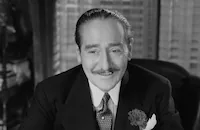
Adolphe Menjou

Virginia Bruce

Rochelle Hudson

Janet Beecher
Tammany Young
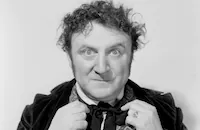
Herman Bing

Lucille La Verne
George Brasno

Olive Brasno
Richard Brasno
May Boley
John Hyams
R. E. "tex" Madsen

Ian Wolfe
Davison Clark
George Macquarrie
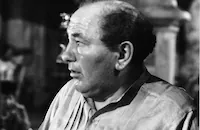
Charles Judels
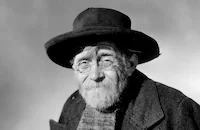
Christian Rub
Frances White
Franklyn Ardell

Ethel Wales
Theresa Maxwell Conover
Brenda Fowler
Greta Meyer
Frank Mcglynn Sr.
Pat Flaherty
Snooky, A Chimpanzee
Sam Adams
Sam Godfrey
Milton Wallace
Maurice Black
Captain E. H. Calvert
Bert Lindley
Emilie Cabanne
Wilbur Higby
Robert Dunbar
Frederick Vroom
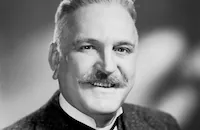
Frank Morgan
Robert Perry
Harry Strang
Ethan Laidlaw
Mike Seibert
Alexander Schonberg
Phon Levy
Theodore Lorch
Frank Hagney
J. Merrill Holmes
Grace Goodall
Murdock Macquarrie
Douglas Greer
Dorian Johnston

Paul Panzer
Lou Archer
Cullen Johnston
Frank O'connor
Jeanne Hart
Harry Wardell
Philo Mccullough
Billy Arnold
John Lester Johnson
Cornelius Ballard
Billy Mcclain
Robert Anderson
Charles West
Lester Dorr
Dick La Marr
Matty Roubert
Ted Mangean
Jane Hamilton
Jolly Ethel
Sid Marion
Bert Wilson
Harry Bowen
Claude Bayton
Tom Cherley
John Cherley
Ada Mae Moore
Otto Frisco
Bhogwan Singh
Suzanne Leach
Herta Lind
Hal Price
Lon Poff
Bert Sprotte
Floyd Shackelford
Gus Leonard
Martin Zahn
Johnny Coonan
Bella Peterson
Kit Guard
Margaret Daggett
Frances Raymond
Nadine Beresford
Lillian Adamson
Cecil Chavers
Dorothy Vernon
Ida Darling
Merle Farris
Henry Herbert
Sidney Jarvis
Clinton Lyle
Sam Appel
Allen Caven
James Cooley
Jim Dundee
Leon Beaumont
Frank Mills
Frank Mayo
Billy West
Jack Stoney
Mark Strong
Frank O'connor
Jack Curtis
Pat Hartigan
Richard Kipling
Harry Semels
Eddie Hart
Max Wagner
Martin Turner
Maude Ogle

Gertrude Astor
Alice Lake

Naomi Childers
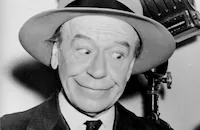
Donald Meek
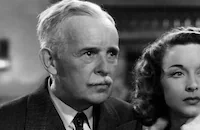
Howard Hickman
Crew
Kenneth Alexander
Emily Baldwin
Stanley Cooley
Peggy Dale
Richard Day
Ed. Ebele
Gene Fowler
Freddie Fox
Buzz Gibson
Matt Gillman
William Goetz
Raymond Griffith
Charles Hall
Roger Heman
Julia Heron
John Huston
Lou Johnson
Omar Kiam
Matt Kluznik
Frank Maher
Peverell Marley
Barbara Mclean
Allen Mcneil
Bess Meredyth
Gale Mogul
Alfred Newman
Joseph M. Schenck
Isabelle Sheridan
United Costumers, Inc.
Darryl F. Zanuck

Film Details
Technical Specs

Quotes
Trivia
Notes
The working titles of this film were Barnum, P. T. Barnum and The Great Barnum. The Twentieth Century-Fox Produced Scripts Collection at the UCLA Theater Arts Library contains a full treatment by John Huston, dated August 9, 1933. In his autobiography, Huston states that after his contract with Universal expired, Darryl Zanuck, 20th Century Pictures' Vice-President in charge of production, gave him two volumes of a current biography of Barnum to read and hired him to write a script based on Barnum's life. Huston writes that he saw in Barnum's "wild energy, boundless vulgarity and casual assumption that he was the shrewdest man alive, an exemplification of the nineteenth-century American dream of conquest and Manifest Destiny." Zanuck, according to Huston, did not care for his approach to the subject, and "wanted to make changes that were out of keeping with my original idea." Huston then suggested that it would be better to start with another script, and Zanuck took him off the project. Huston considered his script to be far better than the one used for the film. Although Huston states that apparently his script no longer exists, the Produced Scripts Collection contains a 115-page treatment by Huston. In addition, the Collection contains a synopsis by Huston dated October 17, 1933, which followed a conference with Zanuck. The synopsis contains many sequences that are in the final film.
Zanuck subsequently put Associate Producer Raymond Griffith to work on the screenplay, and in a document dated February 7, 1934, following a treatment by Griffith, Zanuck states his intentions concerning the proposed film's style: "First, last and always our Barnum should be a comedy, a boisterous, loud-mouthed comedy with a tear. It should be the kind of a picture The Bowery was, full of laughs, full of punch and excitement, yet having a couple of sentimental, pathetic notes. It should not be the kind of picture Silver Dollar was. Silver Dollar made the artistic and box office mistake of taking itself too seriously. It was the Great Drama, the great baloney picture of the rise of a great American character. Audiences don't want to see history or costumes or learn anything about great men unless they can laugh while they are learning....[Barnum] is not a historical, stretched out, ponderous narrative like Silver Dollar that tried to take itself so seriously that audiences think they are being lectured to instead of being hysterically entertained. Do not worry about historical facts or times or dates or truth. We should write a picture for fiction and entertainment...." [The Bowery, 20th Century Pictures' first production, told the fictionalized story of legendary New York characters at the turn of the century, while Silver Dollar (see below), a 1932 First National production, made while Zanuck was production chief at that studio, was based on the life of Colorado silver magnate Horace A. W. Tabor.]
Zanuck subsequently assigned Gene Fowler to write a treatment and then a continuity before appointing Bess Meredyth to collaborate with Fowler on the screenplay. In a modern source, Fowler states that he learned more about screenwriting from Meredyth than from anyone else in the studios. Fowler and Meredyth's screenplay was published in book form in 1934. New York Times commented that the film "is almost sober by comparison with the published edition of the Fowler-Meredyth screen play, with its hilarious marginalia." The pressbook in the copyright descriptions states that the screenplay was the first to be published in book form for the general public.
Virginia Bruce's songs were dubbed by Frances White. New York Times commented, "The dubbing process by which Miss Bruce appears to be singing a lyric soprano is the most convincing that this reporter has ever seen." According to a Hollywood Reporter news item, Edna May Oliver declined Zanuck's offer of the role of "Mrs. Barnum" because she would have had to play alternate days with her role in M-G-M's David Copperfield. According to the pressbook, R. E. "Tex" Madsen, who played the Cardiff Giant, was eight-feet four-inches tall, and George and Olive Brasno, who played Tom and Lavinia Thumb, were brother and sister. The running time in Motion Picture Herald for the preview in Hollywood was 105 minutes. Subsequent listings for running times vary considerably.












